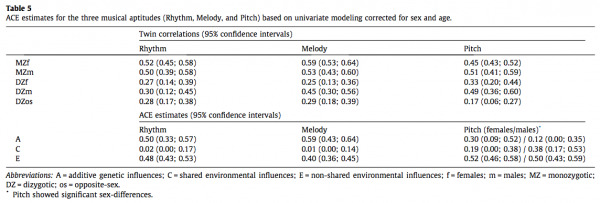Music abilities come from DNA, not practice: so says study
According to a study published in the latest release of Psychological Science would suggest that most musical skill comes from your genes. If you happen to be the descendent of a musical genius, you may want to get practicing – it would seem that you'll have a lot easier time finding success than your less fortunate associates with less musically-inclined parents.
This study, headed by Miriam Mosing, centered on Melody, Rhythm, and Pitch in a new test developed "to tap auditory discrimination of musical stimuli." The "Swedish Musical Discrimination Test," as it's called, was performed on individuals in Sweden between the years of 1959 and 1985.
Again, while the study was conducted between 1959 and 1985, the final release of the study's findings has been published here in 2014.
The test showed how well individuals were able to discriminate between different melodies, rhythms, and pitches. Age appeared to have a "significant" effect on individuals' ability to hear rhythm and pitch, with decreased discrimination skills appearing with increased age.

The chance an individual has of inheriting musical skill from their parent is only slightly different for each of the three SMDT test variables. Melody sits at 59%, Rhythm at 50%, and Pitch at 40%. In other words, you have right around a 50% chance of inheriting musical skill from a parent.
Sex-specific sources of genetic variance were found to be non-significant. This means it doesn't matter whether your father or mother was awesome at the flute – you win either way.
The study goes by the name "Psychometric properties and heritability of a new online test for musicality, the Swedish Musical Discrimination Test," just published in the most recent issue of Psychological Science. Miriam Mosing of the Karolinska Institute in Sweden, the author, has also made the study available through ResearchGate for students. Fredrik Ullén, Miriam A. Mosing, Linus Holm, Helene Eriksson, and Guy Madison all took part in this study.
The study was conducted on 6881 twin individuals. While the exact number may seem strange, that's twins as in humans born together, all recruited from the Swedish Twin Registry. While 32,005 individuals were invited to participate, 11,543 logged in on the questionnaire website and 6881 participants worked on the study, while 6718 participants completed all subtests in the study.
Do these numbers seem right to you? Let us know if you or the people around you are musically inclined, and if so, how much influence you believe a parent's genes have on your ability to drop the beat.
